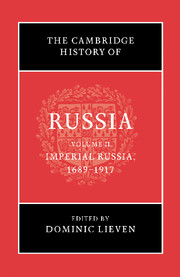Book contents
- Frontmatter
- Introduction
- Part I Empire
- Part II Culture, Ideas, Identities
- Part III Non-Russian Nationalities
- 8 Ukrainians and Poles
- 9 The Jews
- 10 Islam in the Russian Empire
- Part IV Russian Society, Law and Economy
- Part V Government
- Part VI Foreign Policy and the Armed Forces
- Part VII Reform, War and Revolution
- Bibliography
- Index
- Map 5. The Russian Empire (1913). From Archie Brown, Michael Kaser, and G. S. Smith (eds.) Cambridge Encyclopedia of Russia 1982.">
- Plate Section">
- References
10 - Islam in the Russian Empire
from Part III - Non-Russian Nationalities
Published online by Cambridge University Press: 28 March 2008
- Frontmatter
- Introduction
- Part I Empire
- Part II Culture, Ideas, Identities
- Part III Non-Russian Nationalities
- 8 Ukrainians and Poles
- 9 The Jews
- 10 Islam in the Russian Empire
- Part IV Russian Society, Law and Economy
- Part V Government
- Part VI Foreign Policy and the Armed Forces
- Part VII Reform, War and Revolution
- Bibliography
- Index
- Map 5. The Russian Empire (1913). From Archie Brown, Michael Kaser, and G. S. Smith (eds.) Cambridge Encyclopedia of Russia 1982.">
- Plate Section">
- References
Summary
Islam in tsarist Russia has been studied in the Cambridge History for more than a century. Together with more recent scholarship in Russia and abroad, these works have produced a substantial body of literature focusing chiefly on the topics of Muslim resistance to Russian expansion, and controversies between Islamic ‘reformism’ (jadidism) and ‘traditionalism’ (qadimism). Of course, these problems were of great importance for specific Muslim regions in limited historical periods. But they do not exhaust all the diversity of topics concerning Islam in the imperial context. Moreover, both themes used to be approached according to misleading nationalist and modernist conceptions. Taking Islam and the Russian empire for natural antagonists, such a vision relied on the Orientalist approach representing Islam as a homogeneous and timeless entity opposing all non-Muslim cultures. In reality, Islam and the empire seemed to have interacted with each other more often than they engaged in conflict.
Tsarist Russia brought under its control numerous diverse populations inhabiting traditionally Muslim lands in the Volga-Ural region, western Siberia, the North Caucasus and Central Asia. The Volga-Ural region was Islamised more than other Muslim lands of the empire. In the North Caucasus, Siberia and the Kazakh steppe a gradual Islamisation continued until the first half of the nineteenth century. The century and a half from the 1730s until the mid- 1880s was a period of rapid growth and shift for both the polity and Muslim communities within it. At the end of the nineteenth century Russia housed a diverse population of some 14 million Muslims (out of a total population of 150 million subjects).
- Type
- Chapter
- Information
- The Cambridge History of Russia , pp. 202 - 224Publisher: Cambridge University PressPrint publication year: 2006
References
- 9
- Cited by



